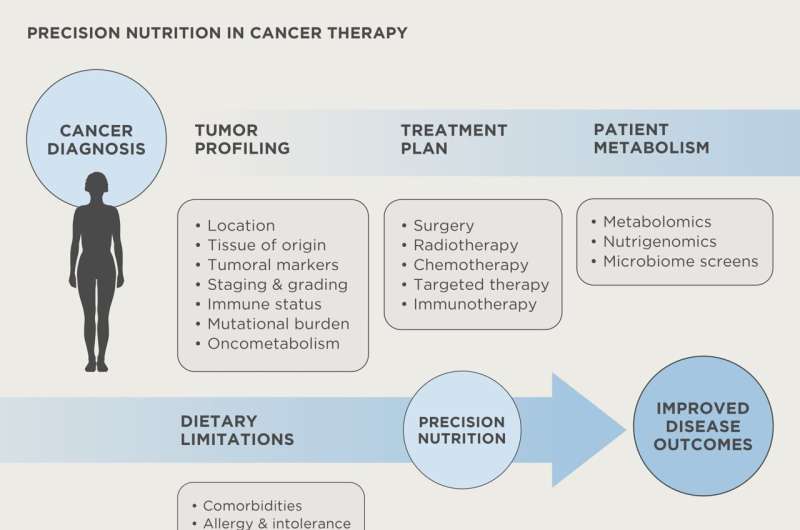This article has been reviewed according to Science X's editorial process and policies. Editors have highlighted the following attributes while ensuring the content's credibility:
fact-checked
peer-reviewed publication
trusted source
proofread
Specifically designed diets demonstrate a 'powerful ability' to prevent tumorigenesis, delay tumor growth

Diet influences the incidence, growth and progression of cancer, to the extent that one-third of the most common cancers can be prevented, at least in part, by dietary changes. And indeed, preclinical studies using food as an anticancer tool have shown promising results. However, these results have not yet reached the clinic.
The Growth Factors, Nutrients and Cancer group at the Spanish National Cancer Research Center (CNIO), led by Nabil Djouder, have now published a review on the use of diet in cancer treatment in Trends in Molecular Medicine, with Carlos Martínez-Garay as first author. They discuss the anticancer effects of various diets and their development for clinical use.
"Diets can directly target cancer metabolism, by depriving the tumor of the nutrients it needs, or they can affect other key elements for cancer survival and development, such as growth signaling, oxidative stress or patient immunity," says Djouder.
According to the authors, one of the reasons why nutritional therapies are not yet reaching cancer patients is that clinical studies carried out so far have limitations. For example, many of these trials group together patients with very heterogeneous tumor profiles. Also, there is a lack of strict standards for the implementation of diets as treatment.
Caloric restriction, ketogenic diet and intermittent fasting
The current study reviews candidate therapeutic nutritional interventions against cancer, and the steps that remain to be taken before they can be considered standard treatment. With this review the authors aim to contribute to the design of new clinical trials and translational studies in this area.
The study focuses on calorie restriction, the ketogenic diet and intermittent fasting, analyzing how they can influence the onset and progression of tumors. After reviewing recent or ongoing preclinical studies and clinical trials on these diets, it offers a new perspective on the physiological rationale behind them.
The authors review in depth what is known about nutrient metabolism and its relationship to tumor occurrence and progression. The data suggest that the spread of some types of cancer may be highly dependent on specific amino acids. Avoiding foods rich in these amino acids could limit the growth of these tumors.
Obesity and the microbiome
In addition, many of the pathways related to tumor growth are linked to hormones that are sensitive to certain nutrients. This could explain the link between obesity and cancer, due to an increase in estrogen (hormone) signaling produced by adipose tissue (fat).
The researchers have also reviewed literature linking intestinal flora to cancer. The intestinal flora or microbiome is the population of microbes present in the intestinal tract and is one of the main factors responsible for the interaction between what a person eats and his or her health.
"Many of the oncogenic effects attributed to the intestinal microbiome," explains Carlos Martínez-Garay, "are related to inflammation in the digestive tract. In fact, the presence of certain populations of bacteria is linked to the chronic inflammation associated with gastrointestinal cancers such as gallbladder, bile duct and stomach cancer."
Interaction with the immune system
One of the main factors responsible for tumor growth, and for therapeutic success, is the interaction between tumor cells and the patient's immunity. In this case there is also a relationship with diet. Most of our immune cells are present in the intestine as a defense barrier against the ingestion of toxic compounds or pathogens.
"Certain components of the diet can provoke important responses in the immune system," says Martínez-Garay, "and this can cause a failure in our defenses that makes us more vulnerable to the formation of tumors."
Precision nutrition for each patient
The authors highlight the need to develop precision nutrition, a novel approach that suggests the use of targeted dietary regimens to treat specific cancers based on the metabolism of the tumor and the patient. The current ability to analyze tumors in depth and classify them according to their molecular profile has enabled a breakthrough in the efficacy of therapies
As Nabil Djouder explains, "This can also be applied to nutrition by combining clinical data, microbiome testing, molecular diagnostics, nutrigenomics and metabolomics to develop specific dietary regimens to treat cancer patients on an individual basis. The preclinical studies and clinical trials we have reviewed show the potent effects of dietary interventions and this leads us to believe that a new era in cancer therapy is approaching."
More information: Carlos Martínez-Garay et al, Dietary interventions and precision nutrition in cancer therapy, Trends in Molecular Medicine (2023). DOI: 10.1016/j.molmed.2023.04.004





















